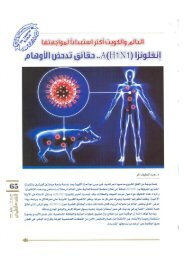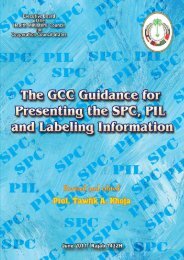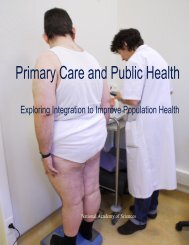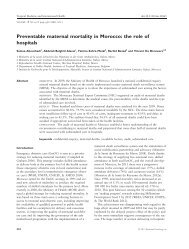Preventing Childhood Obesity - Evidence Policy and Practice.pdf
Preventing Childhood Obesity - Evidence Policy and Practice.pdf
Preventing Childhood Obesity - Evidence Policy and Practice.pdf
Create successful ePaper yourself
Turn your PDF publications into a flip-book with our unique Google optimized e-Paper software.
Developing the political climate for action<br />
Washington DC. It even managed to mobilize senators<br />
to suggest that the US government might refuse<br />
to honor its funding obligations to WHO if it did not<br />
relent over the 916 report.<br />
Simultaneously, the sugar industry was employing<br />
scare tactics in sugar - producing developing countries,<br />
spreading rumors that their local industries would<br />
suffer if the WHO recommendation to limit added<br />
sugars to less than 10% of dietary energy was adhered<br />
to. Focusing on the agriculture ministries meant the<br />
financial “ fear factor ” was taken seriously, <strong>and</strong> the<br />
pressure on WHO was intensified by an elaborate <strong>and</strong><br />
secret critique delivered to the Director - General<br />
personally by the US Department of Health <strong>and</strong><br />
Human Services. Timely media coverage exposed the<br />
clumsy maneuvering of the DHHS Secretary, Tommy<br />
Thompson, to a barrage of protests within the USA<br />
as health professionals <strong>and</strong> NGOs recognized the<br />
unseemly response of the Bush administration to<br />
industry pressure.<br />
The WHO ’ s global strategy was eventually approved<br />
in Geneva in May 2004 11 —but only after an extended<br />
debate in which the USA — represented by George<br />
Bush Snr ’s godson, William Steiger —insisted that<br />
even a footnote referring to the WHO 916 report must<br />
be excised from the final text.<br />
Achieving synergy among<br />
non - governmental organizations<br />
To strengthen WHO in the implementation of its<br />
Global Strategy, the IOTF, with its own parent<br />
body, the International Association for the Study of<br />
<strong>Obesity</strong>, brought together a number of NGOs to form<br />
the Global Prevention Alliance. This consolidated<br />
the early collaboration that had developed with the<br />
International Diabetes Federation, the World Heart<br />
Federation, the International Union of Nutritional<br />
Sciences <strong>and</strong> the International Pediatric Association.<br />
This Global Alliance paved the way for a series of<br />
initiatives to begin to galvanize national NGOs in a<br />
number of countries to engage with their governments<br />
<strong>and</strong> ministries in response to the global strategy.<br />
This catalytic action prompted groups to be<br />
formed initially in a range of countries, for example,<br />
Malaysia, Singapore, Thail<strong>and</strong>, Hong Kong <strong>and</strong> Brazil.<br />
A broader analysis also revealed that most medical<br />
leaders have little underst<strong>and</strong>ing of public health pol-<br />
icy - making <strong>and</strong> often spend their time vying for preferential<br />
ministerial attention to their own speciality.<br />
Nevertheless, WHO Europe, with major NGO<br />
support, managed to convince European ministers of<br />
health to sign a charter on obesity, which included<br />
calls for many changes using legislative <strong>and</strong> regulatory<br />
measures. This is, of course, simply a charter <strong>and</strong> has<br />
no binding political significance, <strong>and</strong> similar solidly<br />
founded documents produced in countries such as<br />
the UK or Australia, which outline the dimensions<br />
<strong>and</strong> forces involved in promoting obesity, do not in<br />
themselves lead to coherent remedial action. The<br />
simple explanation is that ministers consider it unwise<br />
to take on the greatest industrial powers in the l<strong>and</strong>.<br />
The “ big food ” corporate sector includes multinational<br />
companies that have a greater turnover than<br />
many countries.<br />
The recent analysis of obesity, undertaken as part<br />
of the British Government ’ s Foresight Programme, 12<br />
has illustrated in great detail the intricate “ hard -<br />
wiring ” of the vast array of governmental <strong>and</strong> civil<br />
society components that must be considered when<br />
attempting to deal with the multi - factorial pressures<br />
leading to obesity. This recognition of the need<br />
for an overarching “societal” approach, combined<br />
with the analysis of the projected economic burden 12<br />
to society from obesity, was instrumental in the development<br />
of the UK Government ’ s cross - sectoral strategy<br />
on obesity. 13 Even so, this still does not really<br />
tackle the key industrial factors which guarantee an<br />
escalating rate of obesity. The climate of opinion is<br />
beginning to move towards much higher expectations<br />
for action, <strong>and</strong> this has led initially to vague pledges<br />
by industry to improve the nutritional quality of<br />
product ranges.<br />
They have also made limited gestures towards<br />
placing some constraints on marketing to children in<br />
an effort to evade the prospect of more stringent<br />
measures being enforced. This has been enough to<br />
draw some medical <strong>and</strong> nutritional experts into collaboration<br />
with industry, where they have the impression<br />
that they are playing an important role in the<br />
political process, so should not challenge the politicians<br />
to greater action. This requires clearly independent,<br />
media - sensitive groups to lobby for ever greater<br />
change, so that reputable advisers can legitimately<br />
press for progressive <strong>and</strong> innovative strategies to be<br />
implemented.<br />
217

















